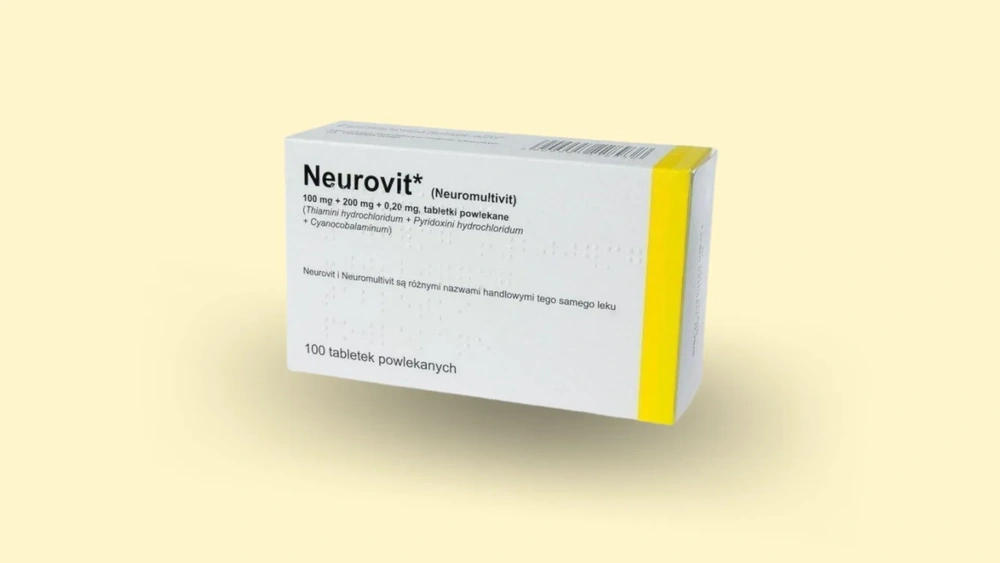

Neurovit

Ask a doctor about a prescription for Neurovit

How to use Neurovit
Leaflet attached to the packaging: patient information
Warning! The leaflet should be kept. Information on the immediate packaging in a foreign language.
Neurovit (Neuromultivit)
100 mg + 200 mg + 0.20 mg, coated tablets
Thiamine hydrochloride + Pyridoxine hydrochloride + Cyanocobalamin
Neurovit and Neuromultivit are different trade names for the same drug.
You should carefully read the contents of the leaflet before taking the medicine, as it contains important information for the patient.
- You should keep this leaflet so that you can read it again if necessary.
- In case of any doubts, you should consult a doctor, pharmacist, or nurse.
- This medicine has been prescribed specifically for you. Do not pass it on to others. The medicine may harm another person, even if their symptoms are the same.
- If the patient experiences any side effects, including any side effects not listed in this leaflet, they should tell their doctor, pharmacist, or nurse. See section 4.
Table of contents of the leaflet:
- 1. What is Neurovit and what is it used for
- 2. Important information before taking Neurovit
- 3. How to take Neurovit
- 4. Possible side effects
- 5. How to store Neurovit
- 6. Contents of the packaging and other information
1. What is Neurovit and what is it used for
Neurovit contains a mixture of vitamins B, B, and B, which are particularly important for maintaining proper metabolism in nerve cells. Like other vitamins, they are essential components of food that cannot be produced by the body.
In the treatment of nervous system disorders, B vitamins work by supplementing the associated vitamin B deficiencies and stimulating natural healing processes in nerve tissue. There are studies indicating the analgesic effect of vitamin B.
Neurovit is used in nervous system disorders caused by a deficiency of B vitamins.
2. Important information before taking Neurovit
When not to take Neurovit
- In case of allergy to thiamine hydrochloride (vitamin B), pyridoxine hydrochloride (vitamin B), cyanocobalamin (vitamin B), or any of the other ingredients of this medicine (listed in section 6).
- In children and adolescents (under 18 years) due to the high dose of vitamins in the medicine.
Warnings and precautions
Before starting to take Neurovit, you should discuss it with your doctor or pharmacist.
If the daily dose of vitamin B taken for a longer period exceeds 50 mg, or if the dose taken for a shorter period exceeds 1 g of vitamin B, numbness or tingling in the hands or feet (symptoms of peripheral sensory neuropathy or paresthesia) may occur. If the patient experiences numbness or tingling or other side effects, they should contact their doctor, who will change the dosage or recommend discontinuing the medicine.
Children and adolescents
Neurovit should not be taken by children and adolescents (under 18 years) due to the high doses of active substances in the medicine.
Neurovit with other medicines
You should tell your doctor or pharmacist about all medicines you are taking, have recently taken, or plan to take.
- Vitamin B may be ineffective if taken with the cytostatic 5-fluorouracil (a medicine used to treat cancer).
- Antacids (used to treat stomach acid) reduce the absorption of vitamin B by the body.
- Long-term use of certain diuretics, such as furosemide, may cause vitamin B deficiencies due to increased excretion of vitamin B in the urine.
- Concomitant use with L-dopa (a medicine used to treat Parkinson's disease) may reduce the effectiveness of L-dopa.
- If Neurovit is taken with medicines that lower the level of vitamin B in the body (such as isoniazid, hydralazine, D-penicillamine, or cycloserine), the need for vitamin B may increase.
Neurovit with food, drink, and alcohol
Food increases the absorption of vitamin B from the gastrointestinal tract, so the tablets should be taken after a meal, with a small amount of liquid.
The absorption of vitamin B is reduced by alcohol and tea.
If vitamin B is taken with drinks containing sulfites (e.g., wine), it may decompose and lose its properties.
Pregnancy and breastfeeding
If you are pregnant or breastfeeding, think you may be pregnant, or plan to have a child, you should consult your doctor or pharmacist before taking this medicine.
Neurovit should not be taken during pregnancy or breastfeeding.
During pregnancy and breastfeeding, the daily need for vitamins should be covered by a balanced diet. Due to the high dose of vitamins in the medicine, Neurovit is intended for use only in vitamin deficiency and should be used only on the advice of a doctor who will carefully weigh the potential benefits and risks.
Vitamins B, B, and B pass into breast milk. High doses of vitamin B may reduce milk production.
The doctor will decide whether Neurovit can be used during pregnancy or breastfeeding in special cases.
Driving and operating machinery
Neurovit does not affect the ability to drive or operate machinery.
3. How to take Neurovit
This medicine should always be taken according to the doctor's or pharmacist's instructions. In case of doubts, you should consult your doctor or pharmacist.
The recommended dose is 1 tablet once a day.
In individual cases, the dose may be increased to 1 tablet three times a day.
The tablets should be swallowed whole, taken after meals, and washed down with a small amount of liquid.
Use in children and adolescents
Neurovit should not be taken by children and adolescents under 18 years.
Taking a higher dose of Neurovit than recommended
Vitamin B
Taking doses higher than 50 mg of vitamin B per day for a longer period (more than 6-12 months) or doses exceeding 1 g of vitamin B per day for a shorter period (more than 2 months) may lead to nerve damage (neurotoxic effect). After taking a dose higher than 2 g per day, nerve damage has been reported, manifesting as movement disorders, sensory disturbances (tingling, numbness), seizures, and in very rare cases, changes in blood tests and inflammatory skin reactions.
Vitamin B
In very rare cases, after taking very high doses, allergic reactions, rashes, and mild acne have been observed.
Missing a dose of Neurovit
You should not take a double dose to make up for a missed dose, but take the next dose at the right time.
In case of doubts about taking the medicine, you should consult your doctor or pharmacist.
4. Possible side effects
Like all medicines, Neurovit can cause side effects, although not everybody gets them.
The following side effects have been reported after short-term or long-term use of Neurovit:
Rare (may affect up to 1 in 10,000 people):
- Nausea
- Headache, dizziness.
Very rare (may affect less than 1 in 10,000 people):
- Hypersensitivity reactions such as sweating, rapid heartbeat, and skin reactions like itching and hives.
Frequency cannot be estimated from the available data:
- Taking doses higher than 50 mg of vitamin B per day for a longer period (more than 6-12 months) may lead to the development of peripheral neuropathy (nerve damage causing numbness or tingling).
Reporting side effects
If you experience any side effects, including any side effects not listed in the leaflet, you should tell your doctor, pharmacist, or nurse. Side effects can be reported directly to the Department of Monitoring of Adverse Reactions to Medicinal Products of the Office for Registration of Medicinal Products, Medical Devices, and Biocidal Products
Al. Jerozolimskie 181C
02-222 Warsaw
Phone: +48 22 49 21 301
Fax: +48 22 49 21 309
Website: https://smz.ezdrowie.gov.pl
By reporting side effects, you can help gather more information on the safety of the medicine.
5. How to store Neurovit
The medicine should be stored out of sight and reach of children.
Do not store above 25°C.
Do not use this medicine after the expiry date stated on the packaging. The expiry date refers to the last day of the month stated.
Translation of some entries on the immediate packaging:
Ch.Nr. – Batch number
Verw. bis – Expiry date
Medicines should not be disposed of via wastewater or household waste containers. You should ask your pharmacist how to dispose of medicines that are no longer needed. This will help protect the environment.
6. Contents of the packaging and other information
What Neurovit contains
- The active substances of the medicine are: thiamine hydrochloride (Thiamini hydrochloridum) (vitamin B), pyridoxine hydrochloride (Pyridoxini hydrochloridum) (vitamin B), and cyanocobalamin (Cyanocobalaminum) (vitamin B).
1 coated tablet contains:
thiamine hydrochloride (vitamin B) 100 mg
pyridoxine hydrochloride (vitamin B) 200 mg
cyanocobalamin (vitamin B) 0.20 mg
- Other ingredients are: Core: modified starch, sodium citrate, citric acid monohydrate, colloidal silica, microcrystalline cellulose, magnesium stearate, povidone. Coating: macrogol 6000, titanium dioxide (E 171), talc, hypromellose, polyacrylate dispersion 30%.
What Neurovit looks like and what the packaging contains
White or almost white, round, and biconvex coated tablets.
PVC/PVDC/PVC/Al or Al/Al blisters in a cardboard box.
20 or 100 coated tablets
To obtain more detailed information, you should contact the marketing authorization holder or the parallel importer.
Marketing authorization holder in Austria, the country of export:
G.L. Pharma GmbH
Schloßplatz 1
8502 Lannach
Austria
Manufacturer:
G.L. Pharma GmbH
Schloßplatz 1
8502 Lannach
Austria
Parallel importer:
Delfarma Sp. z o.o.
ul. Św. Teresy od Dzieciątka Jezus 111
91-222 Łódź
Repackaged by:
Delfarma Sp. z o.o.
ul. Św. Teresy od Dzieciątka Jezus 111
91-222 Łódź
Austrian marketing authorization number: 1-19222
Parallel import authorization number: 581/13
Date of leaflet approval: 20.12.2023
[Information about the trademark]
- Country of registration
- Prescription requiredYes
- Marketing authorisation holder (MAH)G.L. Pharma GmbH
- This information is for reference only and does not constitute medical advice. Always consult a licensed doctor before taking any medication. Oladoctor is not responsible for medical decisions based on this content.
- Alternatives to NeurovitManufacturer: mibe GmbH ArzneimittelPrescription requiredManufacturer: Mako Pharma Sp. z o.o.Prescription requiredManufacturer: Solupharm Pharmazeutische Erzeugnisse GmbHPrescription required
Alternatives to Neurovit in other countries
The best alternatives with the same active ingredient and therapeutic effect.
Alternative to Neurovit in Ukraine
Alternative to Neurovit in Spain
Online doctors for Neurovit
Discuss dosage, side effects, interactions, contraindications, and prescription renewal for Neurovit – subject to medical assessment and local rules.














